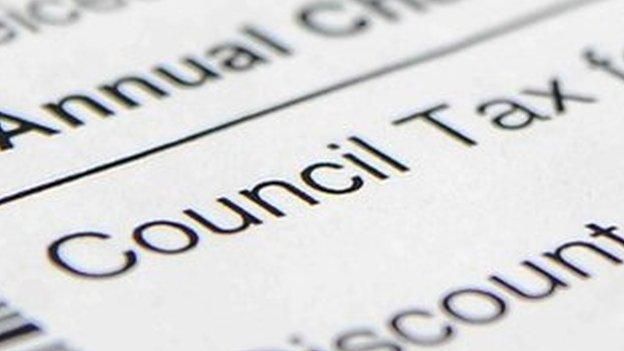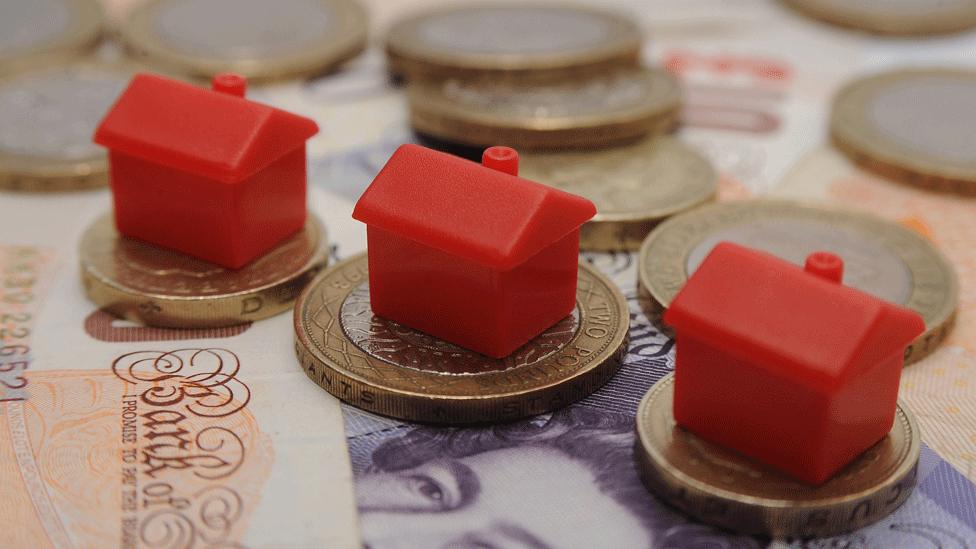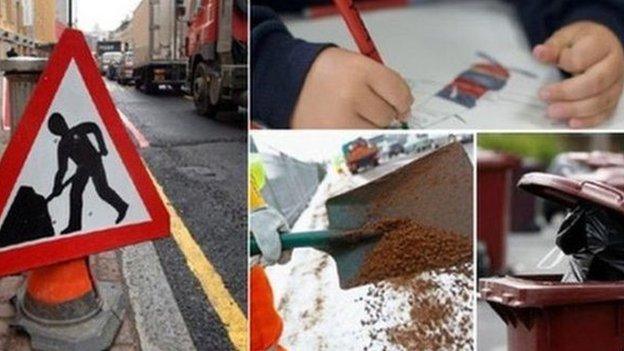"Just Change". But to what?
- Published

It's called "Just Change: a New Approach to Local Taxation". The word 'just' may be a call for fairness.
But the first time I read the title of the report published this week, it seemed like a cry of exasperation, as in "for goodness sake, just make a change, and stop faffing about".
It's more than eight years since Jack McConnell led Scottish Labour out of power with a shambling failure to find an alternative to the council tax.
Alex Salmond led his party into government with a promise to "ditch the hated council tax". That wasn't just any pledge. That was his main one. But instead of ditching it, he froze it.
It remains frozen, and if the freeze is continued into next financial year (John Swinney will tell us in his draft budget this week), the cumulative cost in next year's budget will be £630m.
That comprises £70m given to local authorities for each year that the freeze has been in place.
Frozen and impaled
Who benefits? The Scottish government says that those on lower incomes gain disproportionately. That's because a higher share of their income goes on council tax.
But in terms of actual money saved, a freeze on bills has to benefit those who have the biggest homes with the biggest bills and who therefore avoid the biggest rises.
And that's £630m that could be spent on other priority areas next year, or around £2.5 billion over the course of the freeze so far.
Yet it will be hard politically to make the case for de-frosting the freeze after the Holyrood election in May.
This has become an expensively attractive electoral hook on which MSPs of different hues have become impaled.
New approach
That helps explain why four parties (not the Conservatives) have joined with councillors and public finance experts to find a consensus, sitting on the Commission on Local Tax Reform. It was set up by Nicola Sturgeon soon after she became First Minister.
The second part of their report's title 'A New Approach to Local Taxation' is also an interesting choice of words.
It is exactly what it says - a new approach. But it's hardly the first approach. And it's not a new conclusion.
It finds what others have discovered before - that reform is very, very complex.
Fairness plus...
The easy bit is saying that the council tax should go. But how to replace it?
They wanted to find a solution that:
maximises fairness, with
administrative efficiency and cost, with
stability of revenue for councils, with
effective local accountability, with
a clear public understanding of the system, with
making things difficult for evaders, with
a simple system of rebates, with
ease of transition, with
the art of what is politically acceptable, with
maintaining a cross-party consensus...
... and so it goes on. There is no such tax. So the commission recommended several, all of which have a familiar ring to them.
Indignation
They want to retain a link to property valuation, though recognise that it is not a proxy for ability to pay.

It could be fairer if there were to be a proportionate link to valuation - that is, roughly speaking, someone in a £500,000 home pays five times as much as someone in a £100,000 home. (Cue indignation from leafy suburbs, where small numbers can punch above their weight.)
That was recommended in the Burt Report, commissioned by the Labour/LibDem Scottish government and published nine years ago, but the idea was dismissed by the then first minister hours before it was published.
The latest commission would like to introduce some income tax, but recognises that it carries a big administrative burden. The words "if it could be proved feasible" have to be weighed carefully.
There could be 32 different tax rates, with tiny differences in percentage tax rates - tiny, that is, except to the payroll departments that have to process them.
Also, under current arrangements, a local income tax would not catch investment income. That would benefit the wealthy.
Land value
The report says that "land value tax" is "promising". This was an idea Scottish Greens have been plugging for some time - meaning homes and business tax is paid on the value of whatever land is intended to be used for, after the planners get to work with detailed zoning.
A luxury block of flats or offices would have the maximum rating, and a rocky mountainside suited only to sheep grazing would have the lowest.
That means developers who speculate on undeveloped land, which is zoned for housing, will have an incentive to develop it, in order to get some cash with which to pay the tax bill.
But while being "welcomed" and modelled in some detail, the report concludes that it's a long way from being a realistic option.
Little downsides
That's not all. The commission suggests other taxes could be levied; environmental and resource taxes could be levied on waste or heating inefficiency: sales tax could be added to VAT, and tourist taxes could be levied per bed per night, as visitors check out.

So although the outcome is not absolutely clear, after 80 pages and two hefty annexes, it seems the direction of travel is towards having several local taxes, and perhaps the freedom for councils to choose which ones they wish to deploy.
This has the appeal of diminishing the downsides of any one option. But it would seem to mean a much broader range of downsides.
And one downside that could become impossibly large is that lots of local taxes will come at a high administrative cost; local tax returns, collecting property tax, a comprehensive valuation of all Scottish land, requiring every bed and breakfast owner to file a tourist tax return, maintaining a register of home heating efficiency, and so on.
Parking fines
As it is, council tax provides only 12% of Scottish councils' revenue. One effect of the freeze is that that share has fallen from around 20%, while user charges (including parking fines) have grown as a share.
That means that if a council wants to raise its budget by 3% - to pay for a particular objective such as school improvements - it has to put up council tax by 25%. While local taxpayers pay such a small proportion, the same would be true of any other tax.
This falling share of locally-raised revenue also means that councils have become much more concerned with the way their central government grants are decided than with accountability to their voters.
Opportunity
The conclusions of "Just Change" start with "The present council tax system must end", the nineteenth conclusion states: "This is an opportunity that must not be missed".
Yet the 17 points in between give lots of reasons why you might want to body-swerve this "opportunity".
Now it's over to the manifesto writers for the Holyrood election next May.
Don't be surprised if they kick the local taxation can even further down the road.
- Published14 December 2015
